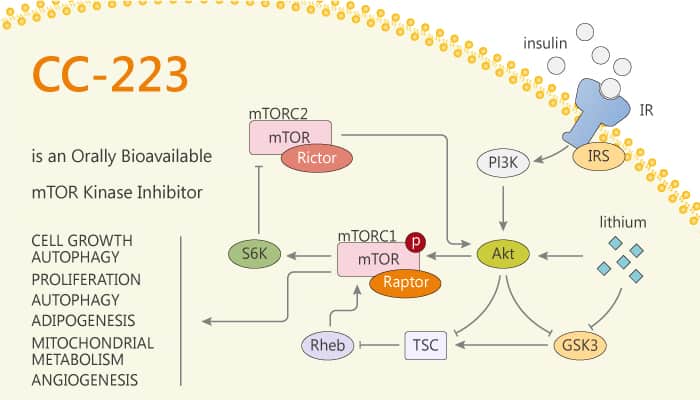mTOR is a serine/threonine kinase that regulates cell growth, metabolism, proliferation, and survival. mTORC1 is a master regulator of cell growth and metabolism. mTORC1 positively regulates cell growth and proliferation. mTORC2 regulates cytoskeletal organization. CC-223 is a potent mTOR kinase inhibitor with an IC50 of 0.016 μM. CC-223 is selective for mTOR kinase with 200-fold selectivity over the related PI3Kα (IC50= 4.0 μM). Moreover, CC-223 inhibits DNA-PK with an IC50 value of 0.84 μM.

CC-223 inhibits both mTORC1 and mTORC2 in cellular systems. Researchers assess cellular inhibition of the PI3K-mTOR pathway by CC-223 in PC-3 prostate cancer cells by western blot analysis. Especially, CC-223 inhibits the direct and indirect mTORC1 substrates p-p70S6K and pS6RP. CC-223 also demonstrates inhibition of the mTORC2 complex. CC-223 reduces phosphorylation of the direct substrate AKT(S473) and the downstream markers PRAS40(T246) and GSK3β(S9). Furthermore, CC-223 inhibits cell growth across a number of cancer cell lines, including cell lines insensitive to Rapamycin treatment.
In vivo, CC-223 inhibits both mTORC1 and mTORC2 following a single oral dose in PC-3 tumor-bearing mice. CC-223 displays dose-dependent tumor growth inhibition in numerous solid tumor xenograft models. Besides, CC-223 significantly inhibits PC-3 tumor growth in a dose- and schedule-dependent manner. CC-223 inhibits proliferation and angiogenesis and induces apoptosis in PC-3 xenograft models
In summary, CC-223 is a potent and selective inhibitor of mTOR kinase with effects on both mTORC1 and mTORC2 substrates in cellular systems and in vivo xenograft studies.